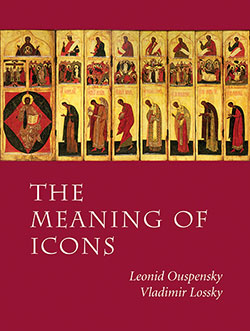 During a June interview with Detroit’s Own Orthodox Radio, the president of one of North America’s foremost Orthodox seminaries was asked about his school’s lauded publishing house, St. Vladimir’s Seminary (SVS) Press.
During a June interview with Detroit’s Own Orthodox Radio, the president of one of North America’s foremost Orthodox seminaries was asked about his school’s lauded publishing house, St. Vladimir’s Seminary (SVS) Press.
“We’re approaching 50 years of service,” said Father Chad Hatfield, who has been a part of the senior leadership of St. Vladimir’s Orthodox Theological Seminary since 2007 — first as chancellor, and then as president since 2016. “It’s remarkable how many people were introduced to Orthodoxy through picking up an SVS Press book, or how many people born to the faith had their faith enriched and deepened with one of these books.”
He added, “Historically, it’s interesting, because I don’t think the seminary had 50 cents to put into the press when it started.”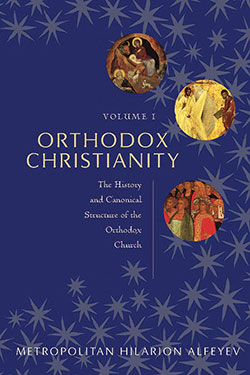
Today, St. Vladimir’s Seminary’s lean-yet-robust publishing program not only operates without a subsidy from the seminary budget, but it also generates a profit that benefits the school. Behind this success is a commitment to furthering the seminary’s mission — a commitment that influences everything from the titles they publish to the prices they charge. As a result, the press meets an important need in the Orthodox community, and it has become the face of St. Vladimir’s Seminary to many outside Orthodoxy.
If you don’t know St. Vladimir’s Seminary Press, your seminary bookstore manager probably does. For close to 50 years, the press has published the Popular Patristics Series, which provides modern translations of the Church Fathers for academic and general readers. Currently at 57 titles, this series has a wide ecumenical audience. SVS Press also publishes a range of titles developed primarily for the English-speaking Orthodox community and is the largest publisher of Orthodox books in English.
Protodeacon Greg Hatrak is marketing and operations director at SVS Press. According to Hatrak, St. Vladimir’s has nearly 500 titles in print (including service books and catechetical materials for the Orthodox Church in America) and publishes between 20 and 25 new titles a year — an impressive output for only five full-time employees.
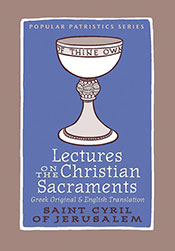 “I really feel that SVS Press offers a wide range of accessible material to various markets,” Hatrak says. “From the young children, with our children’s books, to the strongest of academics, with our monograph series that we started this past year, the original intent and mission of the press has been carried out.”
“I really feel that SVS Press offers a wide range of accessible material to various markets,” Hatrak says. “From the young children, with our children’s books, to the strongest of academics, with our monograph series that we started this past year, the original intent and mission of the press has been carried out.”
Books paved the way
Though marketing the seminary is not the primary purpose of the press, it has nevertheless become one of St. Vladimir’s Seminary’s most effective marketing tools.
“When I’m introduced outside of the United States, that’s almost the first thing that people will say — ‘Oh, SVS Press books,’” says Father Hatfield, who also edits the press’s Orthodox Christian Profiles Series. “That’s in places like Guatemala or Eastern Europe. Wherever it happens to be, those books are known to people.”
Someone who has been with SVS Press from the start is Ted Bazil. Even though he’s officially retired, he’s still at his desk at SVS Press at least a few times a week. Previously Bazil was senior advisor for advancement, SVS Press, and systems and operations.
When Bazil moved to St. Vladimir’s in 1969 to pursue a master of divinity degree, the school bookstore was a couple of students selling class materials in the basement under the old chapel. The seminary published an occasional faculty title, but a publishing program was practically nonexistent. 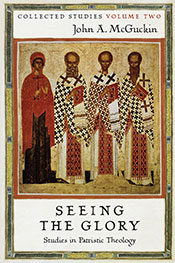
In 1968, St. Vladimir’s had published Great Lent by Father Alexander Schmemann, who served as dean of the seminary from 1962 until his death in 1983. The book was released to an Orthodox community experiencing a renewal of liturgical life, and his explication of the theology behind these services was well received. The book was reprinted in 1969 to meet demand. That same year, the school published what would become Schmemann’s best-known book, For the Life of the World.
“We found tremendous success in publishing these books,” Bazil says. “We took a chance on the first book, Great Lent, and we had a provost who was concerned we were going to lose money. But we reprinted it the next year. We found a real thirst for books that represent Orthodox theology in the English language.”
Bazil worked in the seminary bookstore as a student, and by the time he graduated, he was managing the operation. Father Schmemann and the seminary CFO asked him to stay on to develop the book publishing and sales programs.
Mission-modeled business
The first books that SVS Press published were theological books for Orthodox believers, but in the nearly 50 years since the press began publishing in earnest, the number of subjects has increased.
“We expanded to other areas besides liturgical theology,” Bazil explains. “We have Scripture, church history, liturgical theology. We do music books, CDs, icons, pastoral theology.” The press even publishes cookbooks.
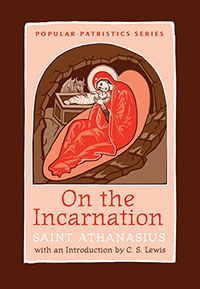 The Popular Patristics Series, with a devoted readership that extends beyond the Orthodox community, includes works of the Church Fathers from Athanasius of Alexandria and Didymus the Blind (both of whom wrote in the fourth century) to Mark the Monk (who was active a century later). The first books in the series were acquired from British publishers, which is why the introduction to On the Incarnation by Athanasius was written by C. S. Lewis. But later titles were commissioned by SVS Press itself, and the series is currently overseen by Father John Behr, the seminary’s former dean, who remains a professor of patristics.
The Popular Patristics Series, with a devoted readership that extends beyond the Orthodox community, includes works of the Church Fathers from Athanasius of Alexandria and Didymus the Blind (both of whom wrote in the fourth century) to Mark the Monk (who was active a century later). The first books in the series were acquired from British publishers, which is why the introduction to On the Incarnation by Athanasius was written by C. S. Lewis. But later titles were commissioned by SVS Press itself, and the series is currently overseen by Father John Behr, the seminary’s former dean, who remains a professor of patristics.
A strategy of relying solely on market-based decision making to determine whether to publish a particular title has the potential of undermining a seminary’s missional goals. Books that benefit the community are not always the most popular — especially academic titles with a limited audience. So donors sometimes support the publication of particular titles with subventions, underwriting the publication and allowing the press to distribute important books at reasonable prices. 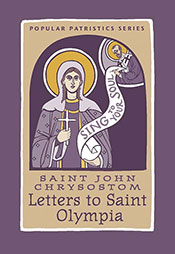
“Our model was to sell 2,000 books at $20 and get them into the hands of the faithful and those who want to read them,” Bazil says. “One book can change a person or change a world. They’re not trinkets, they’re not commodities, but they’re books, and these books have significant power.”
St. Vladimir’s board of trustees also contributes to the successful operation of the press through a press committee and a press advisory group led by Father Hatfield.
The board’s primary role is that of oversight, but recently it has been able to offer industry expertise in the form of a new board member, Michael Hyatt, who heads up the press committee. Hyatt, former chairman and CEO of Thomas Nelson, is a deacon in the Antiochian Christian Archdiocese and author of Platform: Get Noticed in a Noisy World.
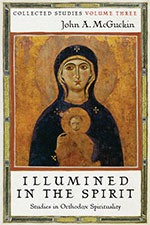 Hyatt has affirmed the work the press has done so far. In a recent board meeting, Father Hatfield was able to show 34 percent profitability, and Hyatt was impressed (according to the president’s account). He said, “Nobody’s doing this!”
Hyatt has affirmed the work the press has done so far. In a recent board meeting, Father Hatfield was able to show 34 percent profitability, and Hyatt was impressed (according to the president’s account). He said, “Nobody’s doing this!”
Hatfield thinks the reason for the seminary’s financial success is their unique niche. “We publish Orthodox Christian materials, and we do it in a quality fashion that has become quite global. Amazon’s our biggest customer.”
Looking past the 50-year mark
A successful press can be appealing to donors, the seminary has found. A major donor recently gave $500,000 to establish an endowment for St. Vladimir’s Seminary Press. “It is our hope with the endowment that we received to use some of the proceeds to increase our visibility in print catalogs as well as digital information,” Hatrak says.
Fourth-century texts in a digital publishing environment. Sounds like an Orthodox plan for the future.
| MEMORY ETERNAL |
| Protodeacon Gregory Hatrak, director of marketing and operations for St. Vladimir’s Seminary Press, died unexpectedly on July 1, 2017, just as Matt Forster was completing this article. He was 46. For an announcement from the seminary about his death, see www.svots.edu/headlines/memoriam-protodeacon-gregory-hatrak. |